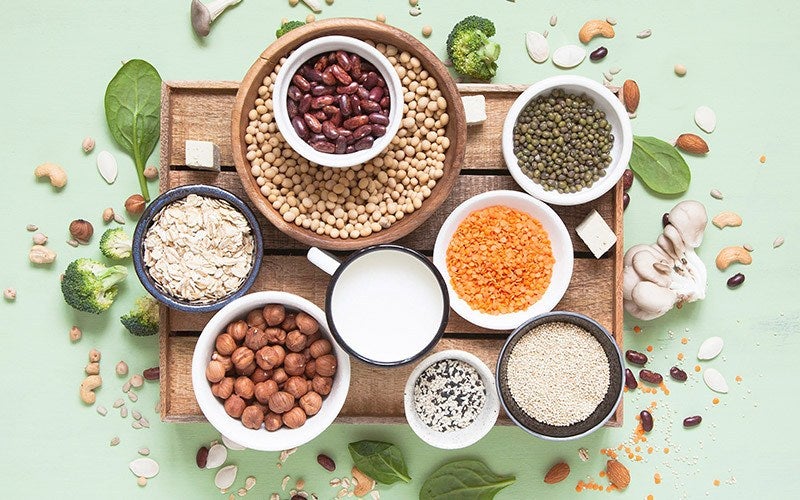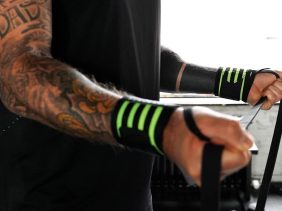23 Excellent Sources of Plant-based Protein
 ©MariaRaz
©MariaRaz
When you hear the name Lewis Hamilton, what do you think? Perhaps that he’s a seven time World Champion Formula 1 race car driver for Mercedes-Benz? That he amassed eight consecutive Constructors’ titles, has been knighted, and is a vocal supporter for Black Lives Matter? He’s all that—and he’s vegan.
Hamilton is among an ever-growing throng of pro-athletes who have banished animal products from their diets. Think tennis superstar Venus Williams, Kyrie Irving of the Brooklyn Nets, former quarterback Colin Kaepernick, ultramarathoner Scott Jurek, English footballer Jermain Defoe of Sunderland AFC, and Lawrence Guy of the New England Patriots.
They are living proof that you don’t need to eat meat to get all the protein you need to build muscle, max out your endurance, and play at the top of your game. And it used to be that options were somewhat limited for vegans, and they had to get creative with their menus. Now there are more plant-based options than ever, such as our vegan protein powder for an easy breakfast base, snack, or post-workout recovery beverage.
Related: Check out these recipes for delicious and healthy meals
What’s the problem with vegans and protein?
Before we answer that question, let’s talk about how protein works. As you know, proteins are the basic building blocks of your cells. Twenty amino acids come together to make protein. The body manufactures 11 of those, leaving nine that are so-called “essential,” which means you have to get them from food sources in order to build muscle and other tissues.
Not all proteins are created equal. Above all, the amino acid composition and digestibility determine the protein’s quality. It’s something called biological value, and it indicates how many grams of protein per 100g you ingest that your body can use.
The body has an easy time utilising protein that comes from animal products, and it’s a complete protein. Plant proteins, on the other hand, don’t all contain the nine essential amino acids, and the ones that they do have may have amounts that are insufficient. Hence why vegetable protein gets such a bad rap.
But research suggests it’s not so much that plant eaters face a lack of protein, but meat eaters face a plethora of it. Over the past century, protein intake has risen along with income levels, coinciding with more widely available and affordable meat, find researchers at Université Paris-Saclay in France and Stanford University Medical School. They looked at studies into how much protein plant-eaters get, and the findings were interesting. “A small fraction of vegans may have an insufficient protein intake, and this phenomenon may be obscured by a much higher and very sufficient intake in the overall population,” they wrote. As for the question of amino acids, that, too, seemed to be a nonissue. Even people who don’t eat a ton of protein-diverse plant foods, as long as they take in fruits and vegetables along with grains, they should be good. Plus, earlier research from Australia finds that the body “pools” amino acids, so you don’t need to get all the essential ones at every meal.
Related: High protein vegan foods for a healthy lifestyle
And if that doesn’t convince you, there are plant-based sources of complete proteins, including soy, legumes, quinoa, and hemp. Even easier, our vegan protein bites help you get a hefty portion of vegetable protein. They combine the highest quality protein sources with peas, hemp, rice and sunflower protein and do not contain any soy. It’s the full protein kick for your muscles.
If you want to feel healthy and fit, you need to change your diet for the long term. Just make sure that you eat a conscious, varied and fresh diet. This way, you will absorb the amino acids you need completely, naturally, and without any stress. To make sure you don’t lose your bearings, we’ll show you which plant-based foods contain plenty of protein per 100 grams.
Your body needs more than protein. Find out more here!
Which plant foods are highest in protein?
These are some of the winners that are generally affordable and available across the country:
|
Food |
Protein per 3.5 ounces |
|
Seitan |
75 |
|
Soybeans |
34 |
|
Hemp seeds |
32 |
|
Pumpkin seeds |
30 |
|
Almonds |
29 |
|
Sunflower seeds |
27 |
|
Peanuts |
25 |
|
Flax |
24 |
|
Red lentils |
24 |
|
Chia seeds |
22 |
|
Pistachios |
22 |
|
Cashews |
21 |
|
Kidney beans |
21 |
|
Tempeh |
19 |
|
Tofu |
17 |
|
Walnuts |
15 |
|
Quinoa |
14 |
|
Edamame |
13 |
|
Oats |
13 |
|
Pine nuts |
13 |
|
Couscous |
12 |
|
Millet |
11 |
|
Buckwheat |
10 |
Easy dinner ideas with plant-based protein
Pan fry cubes of tofu, and toss with grilled broccoli and an Indian simmer sauce. Serve over rice.
Cook buckwheat (soba) noodles, and toss with edamame in a spicy peanut sauce, topped with crushed peanuts.
Make a pesto with pine nuts and pumpkin seeds, and smear on whole grain toast topped with avocado.
Make a pot of red lentils and use the cooking water as the base for a vegetable soup.
Toss flax, almonds, and berries with oats and non dairy yogurt, refrigerate overnight, and enjoy in the morning.
Grill tempeh with the spice mix ras el halout, and roll it up in a grilled pita with raw onion, tomatoes, and a nondairy, unflavored yogurt mixed with chopped dill for a take on gyros.
More healthy eating ideas from foodspring:
- Summer Meal Ideas to Stay Cool
- 14 Easy High-Protein Breakfast Ideas
- 12 foods for muscle building that you should always keep in your pantry
Sources for this article
We at foodspring use only high-quality sources, including peer-reviewed studies, to support the facts within our articles. Read our editorial policy to learn more about how we fact-check and keep our content accurate, reliable, and trustworthy.


































